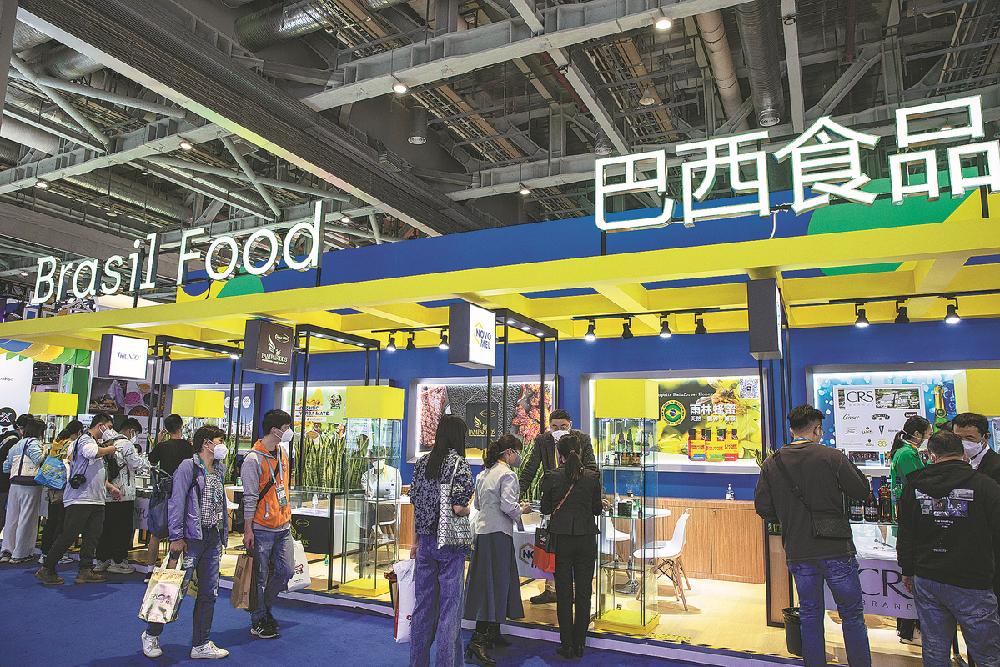
Visitors gather at the exhibition stand of Brazilian food during the fifth China International Import Expo in Shanghai. [Photo/China Daily]
20% of exhibitors at Nov-Dec event will be from overseas, spurring investment
Over 300 well-known Chinese and foreign companies have registered for the Nov 28-Dec 2 inaugural China International Supply Chain Expo.
Coupled with the Chinese government's latest endeavors to optimize the business environment in the country, the expo will further unlock the potential of foreign investment in the domestic market amid current uncertainties shrouding the global economy, the country's top foreign trade and investment promotion agency said on Wednesday.
Ahead of the first edition of the CISCE, which will be held in Beijing, Sun Xiao, spokesman for the China Council for the Promotion of International Trade, said foreign exhibitors constitute over 20 percent of the total, representing a diverse spectrum of 50 countries and regions.
The CCPIT, the expo host, predicted that the number of professional buyers and attendees will exceed 100,000.
Unlike traditional expos, the CISCE is an open international platform that integrates the upstream, midstream and downstream sectors, connects small, medium-sized and large businesses, promotes collaboration between industry and academia and research units, and facilitates interactions between Chinese and foreign companies, the expo organizers said.
In addition to boosting China's exports and attracting global capital, the holding of this event is conducive to enhancing cooperation and sharing opportunities among enterprises from various countries, said Lin Shunjie, board chairman of Beijing-based China International Exhibition Center Group Ltd, a co-organizer of the expo.
Lin said the expo is expected to promote more organized and efficient interconnection of industries among countries, and help build resilient global industrial and supply chains.
"Many foreign companies I have spoken to are quite pragmatic and are looking to seize this rare opportunity. Many firms from the United States have mentioned the need to restructure their global supply chains after three years of COVID-19 disruptions, and it is impossible to neglect both Chinese markets and Chinese companies. This also shows that the CISCE comes at just the right time," he said.
With the government encouraging foreign companies to play a bigger role in the country, Sun, the CCPIT's spokesman, said the agency will listen extensively to the calls of foreign business associations and enterprises and engage in interactive exchanges with them.
Apart from further enhancing regular communication with foreign chambers of commerce and foreign-funded enterprises operating in China, the CCPIT will hold symposiums with multinational corporations, strengthen the functionality of the business environment monitoring system and conduct annual and quarterly surveys on business environment consistently.
"Through these efforts, we will promptly comprehend and facilitate the resolution of challenges and issues faced by foreign-funded enterprises, thus bolstering their confidence in China," Sun said.
Thanks to its vast market and well-developed industrial system, coupled with favorable policies to expand opening-up, China saw the number of newly established foreign-invested enterprises reach 28,406 in its market in the first seven months, up 34 percent year-on-year, data from the Ministry of Commerce showed.
Meanwhile, January-July foreign direct investment from developed countries, such as France, the United Kingdom, Canada and Switzerland, rose by 213.7 percent, 159.9 percent, 113.3 percent and 61.2 percent year-on-year, respectively.
The State Council, China's Cabinet, issued a 24-point guideline in mid-August to attract more foreign capital.
The German Chamber of Commerce in China said China's four-year extension of the individual income tax policies for foreign nationals will make it easier for companies to hire international staff in its market. This comes after China's Ministry of Finance released a notice to continue implementing preferential income tax policies for foreigners earlier this week.
Under this policy, certain allowances for foreigners are exempt from individual income tax, including housing allowances and children's education fees. The policy will be in effect until Dec 31, 2027.
According to the chamber's statement issued on Tuesday, extending the policy well in advance provides predictability for companies and will help keep related costs under control.
